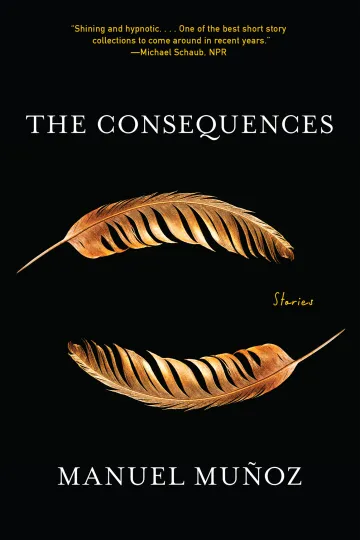‘Honor Your Process’
The author and MacArthur Fellow Manuel Muñoz reflects on writing and community.

Manuel Muñoz at the U of A Environment and Natural Resources 2 Building
Courtesy of MacArthur Foundation
Short-story writer and novelist Manuel Muñoz teaches creative writing at the University of Arizona. His stories focus on the lives of Mexican American communities in the Central Valley of California where he grew up, sometimes working the annual grape harvest. Muñoz earned a bachelor’s degree from Harvard University, where he was a first-generation student, and a master of fine arts from Cornell University. His frequently anthologized work has appeared in publications such as The New York Times and Best American Short Fiction.
In addition to three O. Henry Awards and a Whiting Award, Muñoz has received fellowships from the National Endowment for the Arts as well as the New York Foundation for the Arts. In 2023, he was awarded a MacArthur Fellowship, also known as the “genius grant.” At that time, he remarked, “The short stories I write are proof to the world that we are as complex and complicated as art demands and that our lives belong in works of art.” He was kind enough to sit down with us and discuss writing, the literary world and how it feels to be a MacArthur fellow.
Q: What supports your writing?
A: That has been changing over time. I’m often watching a movie from the Criterion Collection or indulging in a horror movie or something campy just to keep my mind on story. In the mornings, I’ll usually read a short story or chapter of a novel. I kind of walk around my kitchen, holding up the book. And it gives me a little chance to meditate. These latest practices have been about thinking small and not overwhelming myself.
Q: Could you describe a time you felt discouraged about your writing and how you handled it?
A: I had a very long period between books where I had lost my publisher and I wasn’t sure if I wanted to keep writing. I had to come to terms with the fact that I was putting too much worth on what publishing books meant to my identity as a writer as opposed to what I had always been taught as a student, which is honor your process. And [that helped me] no longer feel the pressure of answering to anybody but myself, but it took a while to get there. I mean, 11 years between books is a long time.
Q: Is there something you consistently tell your students and aspiring writers about writing or publishing?
A: Don’t engage in any kind of comparison, not to mention competition, with other people, because no work is like your own. Celebrate success when it comes, embrace it and be proud of it, but don’t focus on the outcome of your process. My mentor, Helena María Viramontes, gave me the best advice I’ve ever received, and I didn’t think it was good at the time. She said to me, “No one is waiting for it,” which sounds harsh, but it’s also very liberating. Just work on it, finish it, mold it the way you want before you think [about publication].
Q: What surprised you most when you were writing your most recent book, “The Consequences”?

Courtesy of MacArthur Foundation
A: That it was a book at all. Honestly. I was just writing stories, not trying to put together a collection, but it came together because of an Italian publisher. Sara Reggiani, the editor of Edizioni Black Coffee, encountered a story of mine while translating an issue of Freeman’s journal, got in touch with my agent and sent a contract. I appreciated her interest and thought, “Wouldn’t it be great to publish in Italian as a commentary on what U.S. publishing does to writers in my community?”
Q: How do you define your community, and what does the U.S. do to writers in your community?
A: Publishing is difficult for everybody. Let me just start by saying that. However, some communities have historically struggled to gain a foothold in the U.S. publishing industry. The Mexican American community along the West Coast, Southwest and Texas, for example. For a long time, the understood route for us was to go to a small press with a first book and then go to the “Big Five” — there needed to be proof of audience. This is true even of writers that we now think of as giants — Sandra Cisneros, Helena Viramontes, Luis Alberto Urrea. Publishing has since seemed to wake up, but you need infrastructure — you need editors and publicists and marketers to do the work and be on the same page, which often doesn’t happen.
Q: How has the MacArthur “genius grant” impacted you?
A: It’s been an overwhelming experience. The past couple of months have been transformative, and maybe in ways that I’m not entirely comfortable with yet, so I’m still sorting that out. One of my students congratulated me and I said, “This couldn’t have happened to a more retreating person.” I just want to do my work. I’m not used to it, and I’m not sure I’m going to get used to it. I don’t know what’s going to happen down the road because of it in terms of visibility for Mexican American writers. We’ll see.
‘Celebrate success when it comes, embrace it and be proud of it, but don’t focus on the outcome of your process.’
